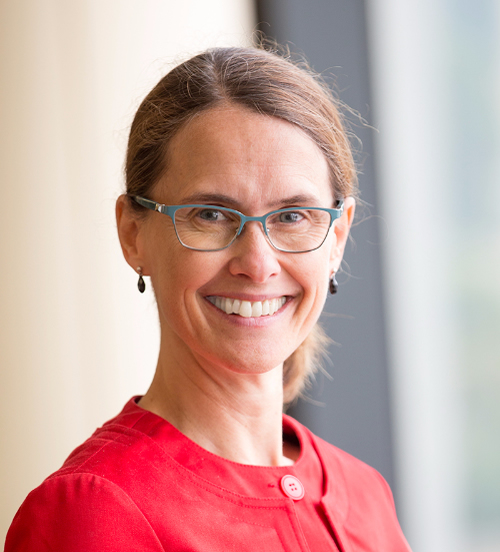Dr. Julie Falardeau, Thelma and Gilbert Schnitzer Professor of Ophthalmology at the OHSU School of Medicine, Casey Eye Institute

Neuro ophthalmologist Dr. Julie Falardeau considers herself a bit of a detective.
“Patients will come in with symptoms, like vision loss or double vision, and the eye exam does not always give us answers. But, in the vast majority of these cases, a thorough history will lead us on the right path to arrive at a diagnosis. Sometimes it is a piece of information the patient thought insignificant or unrelated, and only provided the critical clue when asked. We’re trying to put all the pieces together. Is it the brain? Is it a nerve problem? Or is it a problem with another part of the eye? It can be time-consuming but I find that extremely stimulating,” said Dr. Falardeau.
Dr. Falardeau has been seeing patients and conducting research in neuro-ophthalmology at Casey since 2005. As the only full-time neuro-ophthalmologist in the state, she is in high demand and sees patients from across the region.
Falardeau is an active and sought-after clinical researcher, participating in a range of research projects that include specialists from across OHSU — and the world. For example, she’s collaborating closely with colleagues from OHSU’s multiple sclerosis clinic to explore novel treatments for optic neuritis, a condition that sometimes arises in MS patients and causes vision loss. She is also part of a multi-disciplinary team testing new approaches to treating idiopathic intracranial hypertension, a condition associated with elevated intracranial pressure that creates swelling of both optic nerves, putting patients at risk of permanent vision loss.
And sometimes there is no solution, only hard news. “I see a lot of patients who have conditions for which there’s no treatment – such as vision loss after a stroke. Quite often they have been given that diagnosis already by their local eye care provider, but they come to me to confirm it. One of the most important roles I play is to take extra time to explain what happened and what needs to be done to reduce the risk of a similar event down the road and to maximize their overall health. Understandably, patients are often disappointed to hear that nothing can be done to improve their vision. However, they are very appreciative of the extra time we spent with them and despite the hard news, the interaction ends up being positive and rewarding,” said Falardeau.
In addition, Dr. Falardeau has demonstrated a tremendous commitment to the profession of ophthalmology. For over a decade she has volunteered her time as an examiner for the American Board of Ophthalmology. Her dedication to Board activities recently led her to be selected to serve as a Director on the American Board of Ophthalmology. Selection for this important role is extraordinary and reflects the high esteem with which she is viewed by ophthalmologists across the nation.